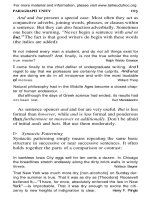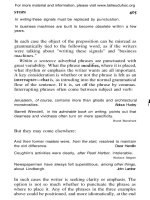Tài liệu Essential guide to writing part 16 pdf
Bạn đang xem bản rút gọn của tài liệu. Xem và tải ngay bản đầy đủ của tài liệu tại đây (289.07 KB, 15 trang )
(4) VARIETY
How much recurrence, how much variety depend on sub-
ject and purpose. For instance, when you repeat the same
point or develop a series of parallel ideas, the similarity of
subject is enhanced of sentence
structure. Thus Adams repeats the same pattern in his second
through seventh sentences because they have much the same
content, detailing the steps President Harding took to divert
the scandal threatening his administration. Here the recurrent
style evolves from the subject.
In the other passage, however, the writer makes no such
connection between style and subject, and so the recurrence
seems awkward and monotonous. The ideas expressed in the
separate sentences are not of the same order of value. For
example, the fact that the theater is in Hartford is less im-
portant than that it shows foreign films. The sentence style,
in other words, does not reinforce the writer's ideas; it ob-
scures them.
Nor has the writer offered any relief from his short,
straightforward statements. Adams has. Moreover, Adams
uses variety effectively to structure his paragraph, opening
with a relatively long sentence, which, though grammatically
simple, is complicated by the correlative but" con-
struction. And he closes the paragraph by beginning a sen-
tence, for the first time, with something other than the
subject.
Adams's brief sentences work because the subject justifies
them and because they are sufficiently varied. Lacking similar
justification or relief, the four sentences of the first passage
are ineffective. They could be improved easily:
The Art Cinema, a movie theater in Hartford, specializes in
films. It is noted for the high quality of its films; in fact, many people
consider them good art.
There is still recurrence: in effect the passage consists of three
similar short clauses plus an appositive. But now there is more
variety. In the first sentence an appositive interrupts subject
For more material and information, please visit www.tailieuduhoc.org
THE SENTENCE
and verb; in the second there are two clauses instead of one,
the latter opening with the phrase "in fact." Subordinating
the information about Hartford also keeps the focus where it
belongs, on the films.
Of course, in composing a sentence that differs others,
a writer is more concerned with emphasis than with variety.
But if it is usually a by-product, variety is nonetheless im-
portant, an essential condition of interesting, readable prose.
Let us consider, then, a few ways in which variety may be
attained.
Changing Sentence Length and Pattern
From the beginning she had known what she wanted, and pro-
ceeded single-minded, with the force of a steam engine towards
her goal. There was never a moment's doubt or regret. She wanted
the East; and from the moment she set eyes on Richard Burton, with
his dark Arabic face, his "questing panther eyes," he was, for her,
that lodestar East, the embodiment of all her thoughts. Man and
land were identified. Lesley Blanch
It is not necessary, or even desirable, to maintain a strict
alternation of long and short statements. You need only an
occasional brief sentence to change the pace of predominately
long ones, or a long sentence now and then in a passage com-
posed chiefly of short ones:
We took a hair-raising taxi ride into the city. The rush-hour traffic
of Bombay is a from dementia, as in Tokyo; nor
from exuberance, as in Rome; not from malice, as in Paris; it is a
chaos rooted in years of practiced confusion, absentmindedness,
selfishness, inertia, and an incomplete understanding of mechanics.
There are no discernible rules. James Cameron
Dave Beck was hurt. Dave Beck was He took the fifth
amendment when he was questioned and was forced off the ex-
ecutive board of the but he retained enough control of
his own union treasury to hire a stockade of lawyers to protect him.
For more material and information, please visit www.tailieuduhoc.org
(4) VARIETY
Prosecution dragged in the courts. Convictions were appealed.
Delay. John Dos Passos
Sometimes variation in length can be used to emphasize a
key idea. In the following passage the historian Herbert But-
moves through two long sentences (the second a bit
shorter than the to a strong short statement:
The Whig historian is interested in discovering agency in history,
even where in this way he must avow it only implicit. It is char-
acteristic of his method that he should be interested in the agency
rather than in the process. And this is how he achieves his
simplification.
Fragments
Fragments, usually a special kind of short sentence, make for
effective to see and easy to use (italics high-
light the fragments in the next examples):
Sam steals like this because he is a thief. Not a big thief. He tried
to be a big thief once and everybody got mad at him and made
him go away to jail. He is strictly a small thief, and he only steals
for his restaurant. Jimmy Breslin
Examinations tend to make me merry, often seeming to me to be
some kind of private game, some secret ritual compulsively played
by professors and the institution. invariably become facetious in
all the critical hours. All that solemnity for a few facts! couldn't
believe they were serious. never quite understood it.
Mary Caroline Richards
Used with restraint, fragments like these are a simple way to
vary your sentences. They are, however, more at home in a
colloquial style than in a formal one.
Rhetorical Questions
Like fragments or any other kind of unusual sentence, rhe-
torical questions are rarely used for variety alone. Their
For more material and information, please visit www.tailieuduhoc.org
238 THE SENTENCE
primary purpose is to emphasize a point or to set up a topic
for discussion. Still, whenever they are employed for such
ends, they are also a source of variety:
But is the subject. One must say
what must one say about Toronto? What can one? What has any-
body ever said? It is impossible to give it anything but commen-
dation. is not squalid like Birmingham, or cramped Canton,
or scattered like Edmonton, or sham like Berlin, or hellish like New
York, or tiresome like Nice. It is all right. The only depressing thing
is that it will always be what it is, only larger, and that no
city can ever be anything better or different. If they are good they
may become Toronto. Rupert Brooke
Varied Openings
Monotony especially threatens when sentence after sentence
begins the same way. It is easy to open with something other
than the usual subject and verb: a prepositional phrase; an
adverbial clause; a connective like therefore or an adverb like
naturally, or, immediately following the subject and splitting
it from the verb, a nonrestrictive adjectival construction. Take
a look at this passage:
In the first decade of the new century, the South remained primarily
rural; the beginnings of change, in those years, hardly affected the
lot of the Negro. The agricultural system had never recovered fully
from the destruction of the old plantation economy. Bound to the
production of cotton, rice, soil suf-
fered from erosion and neglect. Those who cultivated it depended
at best upon the uncertain returns of fluctuating world markets. But
the circumstances under which labor was organized, particularly
Negro labor, added to those difficulties further hardships of human
Creation. Oscar Handlin
Handlin's five sentences show considerable variety in their
openings: a prepositional phrase, a subject, a participial
phrase, a subject, and a connective word.
For more material and information, please visit www.tailieuduhoc.org
(4) VARIETY
Interrupted Movement
a or even a second, in-
dependent sentence between main elements of a clause so that
pauses are required on either side of the var-
ies straightforward movement. Here the writer places a sec-
ond sentence between two clauses (italics added):
had halted on the road. As soon as saw the elephant knew with
perfect certainty that ought to shoot him. It is a serious matter to
shoot a working is comparable to destroying a huge
and costly piece of obviously one ought not to do
it if it can possibly be avoided. George Orwell
For more material and information, please visit www.tailieuduhoc.org
V
Diction
For more material and information, please visit www.tailieuduhoc.org









